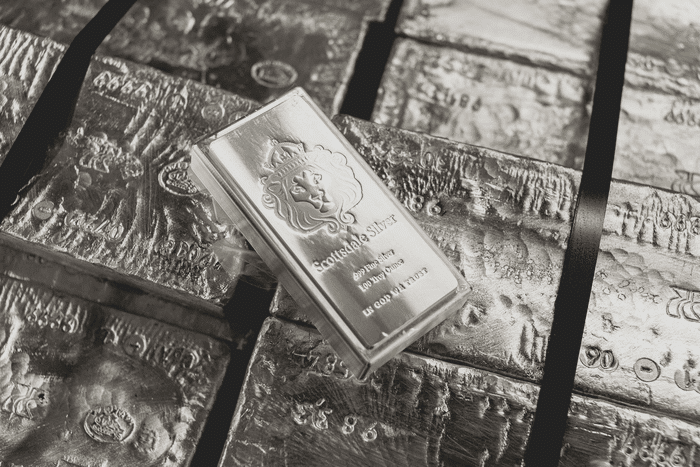
In this week’s missive:
- Silver demand expectations and production
- Volatility: Silver’s head to head matchup with gold
- Preparing for mammoth bull market spikes
- The Lightning Rod: What’s next for silver
While it was too brittle for making swords, silver’s shine and scarcity made it a top choice for trading long ago.
Empires from Rome to Spain were all over silver, mining it whenever they could.
It even became the backbone of many major currencies like the Greek Drachma and the Spanish dólar.
- Here’s a fun fact for silver enthusiasts: the Spanish Dólar influenced Alexander Hamilton to establish the US Dollar when America was just starting.
Today, silver stands out for its practicality and affordability compared to gold.
It’s not just for show; over 50% of silver serves industrial needs, powering sectors from electronics to metalworking.
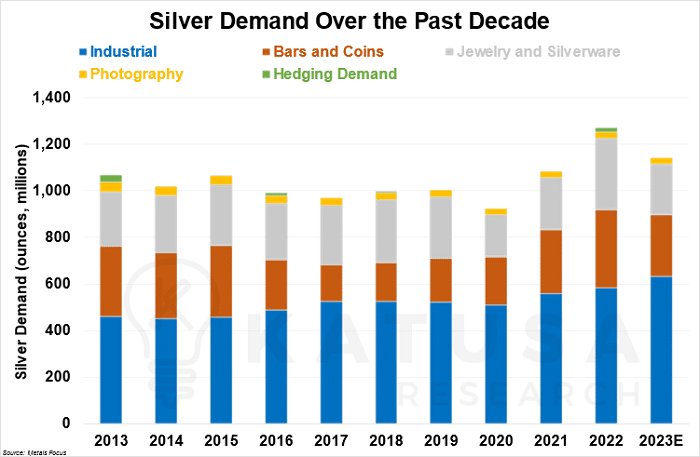
So, while silver might seem like it’s in the luxury league, it’s a hardworking metal with a crucial role in our daily lives and industries.
Here’s Where Silver Comes From
Nearly half of primary silver production comes from Latin America, or the Silver CAMP: Chile, Argentina, Mexico and Peru.
(And let’s not forget Guatemala will become a major producer once my buddy Ross Beaty starts up the Escobal silver mine. It’s one of the world’s most attractive primary silver mines.)
All these countries eventually came around to classifying mining as an essential service. But a serious outbreak or accident on a mine site could still result in closures.
Below is a chart showing the estimated global silver production for this year.
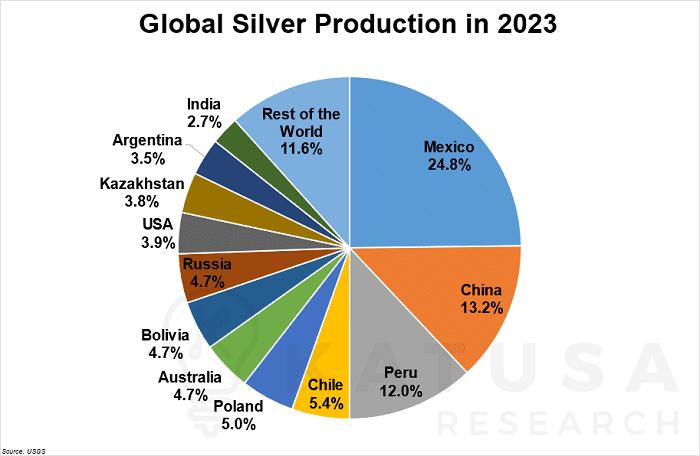
- Mexico is the largest producer of silver in the world by a comfortable margin, thanks to its generous healthy reserves and low costs of production.
China is also a major player in this space, having maintained steady production of roughly 3,500 tonnes a year for the past decade.
In terms of reserves, however, the largest in the world belong to Peru, with Australia and Russia not far behind.
You can likely count on these three countries to spearhead silver production in the decades to come.
Silver and Gold Volatility, Head-to-Head
But there’s another reason why most portfolio managers won’t put ‘silver’ in the same breath as US Treasuries, Japanese Government Bonds, US Dollars and Gold…
That’s because it’s simply too volatile to act as a hedge.
In the following chart, look at the volatility comparison…
Showing that silver’s daily price fluctuations, including gains and losses, have been significantly higher than gold’s over the past decade..
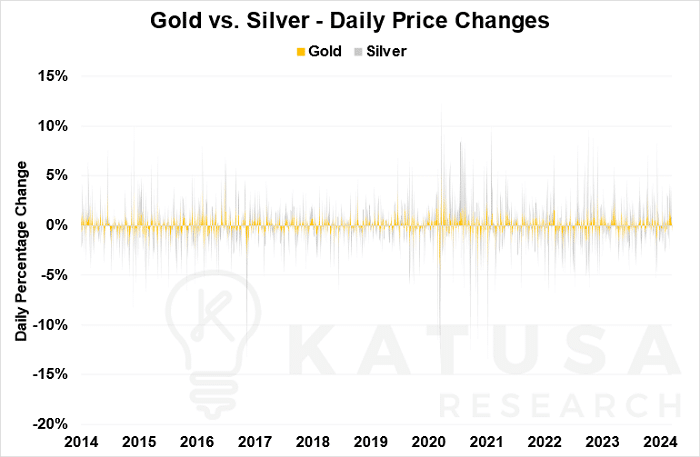
Silver’s price fluctuations have been remarkably dramatic in recent decades, testing the resilience of even the most dedicated investors.
Remember, many of silver’s significant price movements have stemmed from extraordinary market conditions.
For example, the Hunt brothers’ attempt to monopolize the silver market in the early 1980s caused a record-setting price spike.
Similarly, silver reached another peak in 2011 amid the US Debt Ceiling Crisis as investors sought refuge in precious metals, fearing a potential government financial shortfall.
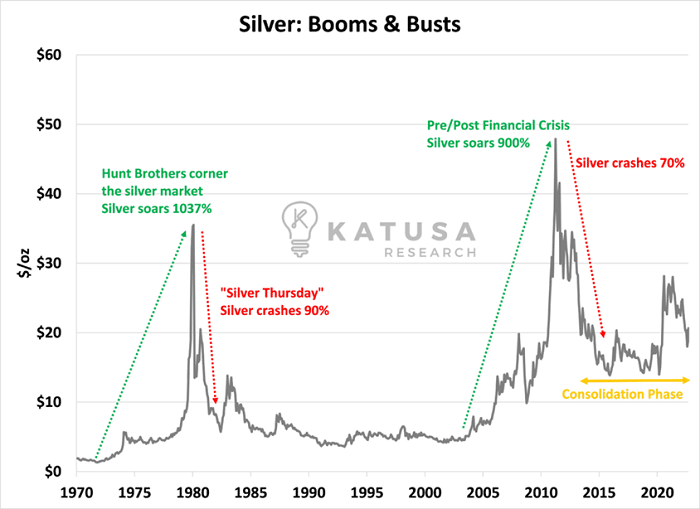
Now, the reason that silver can make such massive moves so quickly when compared to gold is because the global market cap is tiny.
Thus, any marginal increase in silver buying or selling tends to send prices into a frenzy.
Putting this into perspective, take a look at this chart comparing the silver market to other major asset classes and well-known companies.
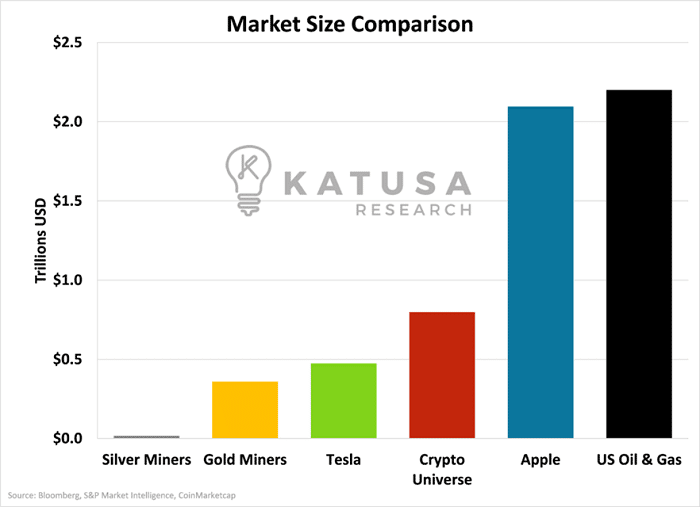
- As you can see, the entire silver market is a blip relative to these other sectors.
And this creates massive leverage for silver because of its small scale.
Remember how violent the rise in the once-tiny cryptocurrency sector was when the capital first started flowing in?
It’s exactly the same case for silver – scale is key for massive gains.
“A Lightning Rod”: What’s Next for Silver?
Keep in mind that silver is useful both as an industrial metal and as a store of value.
This has the potential to be a double whammy for prices when things heat up.
Hence why the hyper-aggressive easing policies global central bankers have used since 2008 are positive for silver’s industrial use and monetary use.
Take a look at how the price ratio of gold to silver has varied over the past decade:

Currently, the gold to silver ratio is moving higher away from its 10-year historical average.
- In other words, right now silver is undervalued relative to gold, according to the historical trend.
With gold leading the precious metals peloton, silver is going unnoticed drafting behind its gilded race partner.
Gold may be up 4.9% so far this year – but silver isn’t far behind at 4.3%.
Given how silver is currently the cheaper of the two, it’s not far-fetched to think that silver could catch a bid. And sprint past gold to the finish line.
Remember – it has in the past.
Regards,
Marin Katusa
P.S. if you want to get first in line on all resource-related stocks I’m looking at, consider a subscription to my monthly newsletter – Katusa’s Resource Opportunities.
Details and Disclosures
Investing can have large potential rewards, but it can also have large potential risks. You must be aware of the risks and be willing to accept them in order to invest in financial instruments, including stocks, options, and futures. Katusa Research makes every best effort in adhering to publishing exemptions and securities laws. By reading this, you agree to all of the following: You understand this to be an expression of opinions and NOT professional advice. You are solely responsible for the use of any content and hold Katusa Research, and all partners, members, and affiliates harmless in any event or claim. If you purchase anything through a link in this email, you should assume that we have an affiliate relationship with the company providing the product or service that you purchase, and that we will be paid in some way. We recommend that you do your own independent research before purchasing anything.






